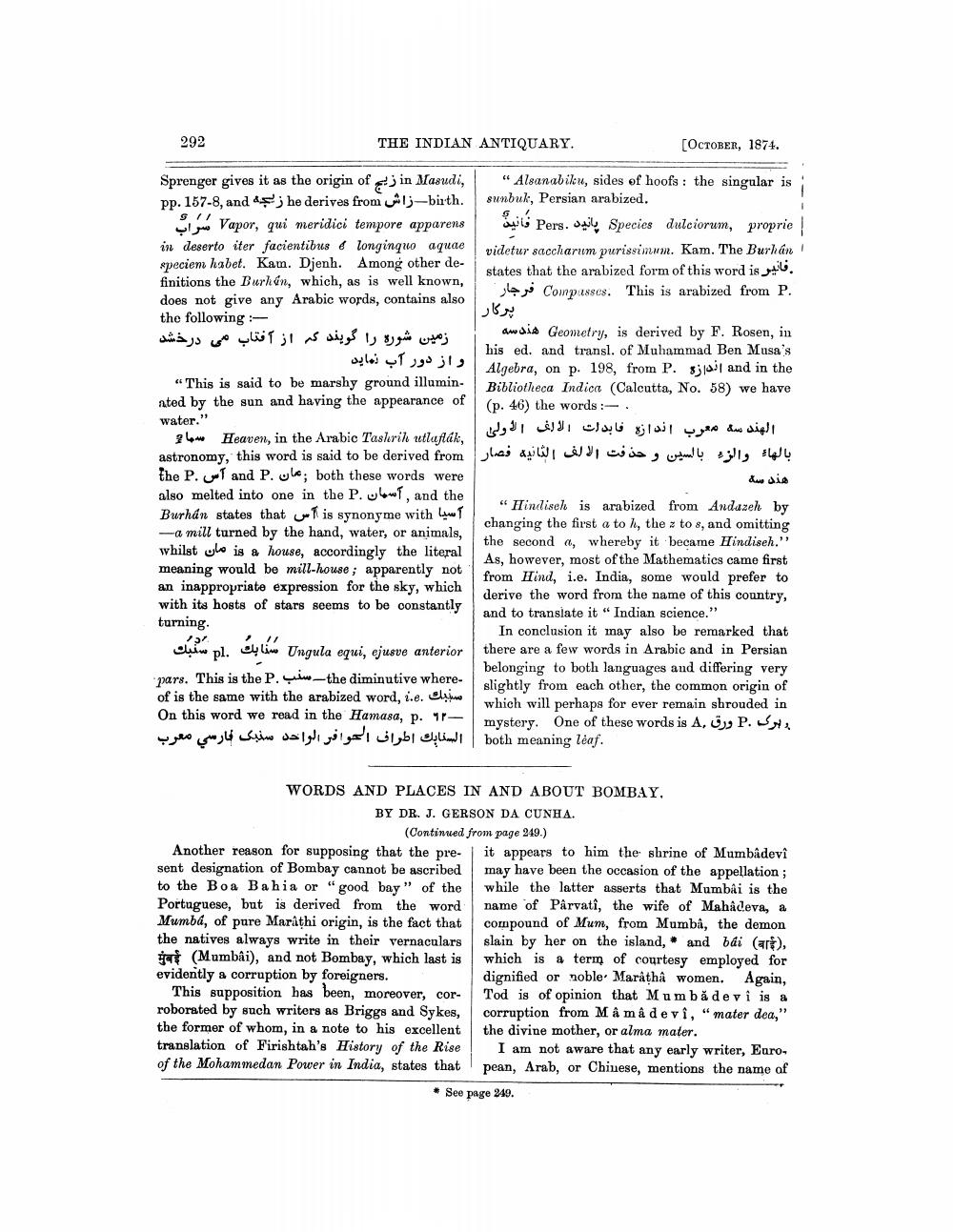________________
292
SII
Sprenger gives it as the origin of in Masudi, pp. 157-8, and he derives from -birth. Vapor, qui meridici tempore apparens in deserto iter facientibus é longinquo aquae speciem habet. Kam. Djenh. Among other definitions the Burhén, which, as is well known, does not give any Arabic words, contains also the following:
THE INDIAN ANTIQUARY.
زمین شوره را گویند که از آفتاب می درخانه
ر از دور آب نماید
"This is said to be marshy ground illuminated by the sun and having the appearance of
water."
2 Heaven, in the Arabic Tashrih utluflák,
the P. and P. ; both these words were also melted into one in the P. f, and the Burhan states that is synonyme with -a mill turned by the hand, water, or animals, whilst le is a house, accordingly the literal meaning would be mill-house; apparently not an inappropriate expression for the sky, which with its hosts of stars seems to be constantly turning. 757
.pl سنيك
سنابك
Ungula equi, ejusve anterior
pars. This is the P. -the diminutive whereof is the same with the arabized word, i.e. On this word we read in the Hamasa, p. 1
الهند سه معرب اندازه فابدلت الألف الأولى بالهاء والزء بالسين و حذفت الألف الثانية فصار | astronomy, this word is said to be derived from
هند سه
السنابك اطراف الحوافر الواحد سنبك فارسي معرب
[OCTOBER, 1874.
"Alsanabiku, sides of hoofs: the singular is sunbuk, Persian arabized.
وانية
Another reason for supposing that the present designation of Bombay cannot be ascribed to the Boa Bahia or "good bay" of the Portuguese, but is derived from the word Mumbá, of pure Marathi origin, is the fact that the natives always write in their vernaculars
(Mumbai), and not Bombay, which last is evidently a corruption by foreigners.
This supposition has been, moreover, corroborated by such writers as Briggs and Sykes, the former of whom, in a note to his excellent translation of Firishtah's History of the Rise of the Mohammedan Power in India, states that
Pers. Species dulciorum, proprie | videtur saccharum purissimum. Kam. The Burhan states that the arabized form of this word is. Compasses. This is arabized from P.
پرکار
awais Geometry, is derived by F. Rosen, in his ed. and transl. of Muhammad Ben Musa's Algebra, on p. 198, from P. sjal and in the Bibliotheca Indica (Calcutta, No. 58) we have (p. 46) the words:
"Hindisch is arabized from Andazeh by changing the first a to h, the z to 8, and omitting the second a, whereby it became Hindisch." As, however, most of the Mathematics came first from Hind, i.e. India, some would prefer to derive the word from the name of this country, and to translate it "Indian science."
In conclusion it may also be remarked that there are a few words in Arabic and in Persian belonging to both languages and differing very slightly from each other, the common origin of which will perhaps for ever remain shrouded in mystery. One of these words is A, , P. both meaning leaf.
WORDS AND PLACES IN AND ABOUT BOMBAY, BY DR. J. GERSON DA CUNHA. (Continued from page 249.)
it appears to him the shrine of Mumbâdevî may have been the occasion of the appellation; while the latter asserts that Mumbai is the name of Pârvati, the wife of Mahadeva, a compound of Mum, from Mumbâ, the demon slain by her on the island, and bái (art), which is a term of courtesy employed for dignified or noble Maratha women. Again, Tod is of opinion that Mum bă devi is a corruption from Mâmâ devi, "mater dea," the divine mother, or alma mater.
I am not aware that any early writer, European, Arab, or Chinese, mentions the name of See page 249.




